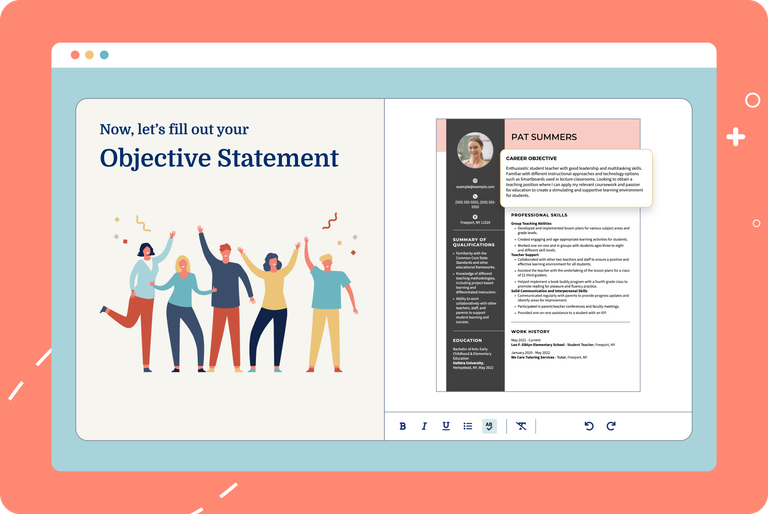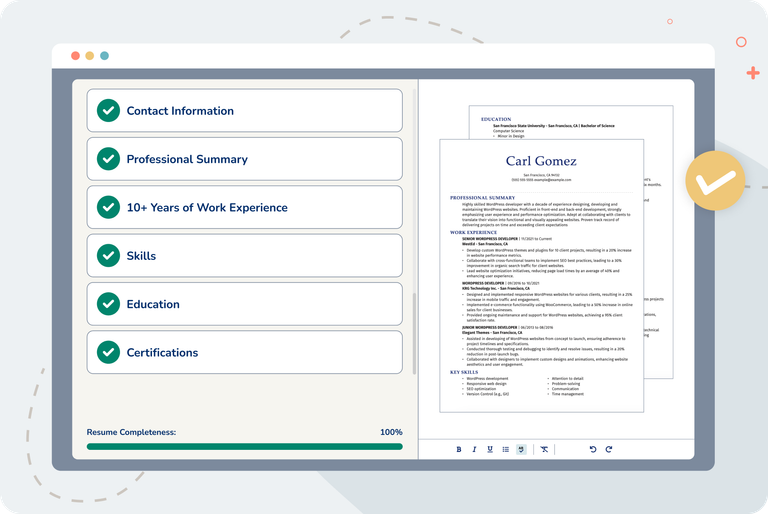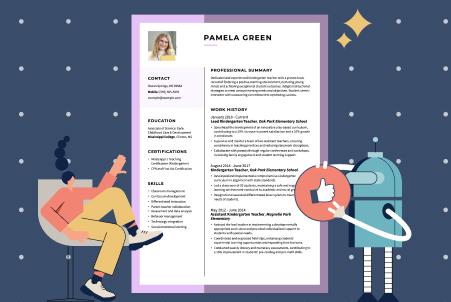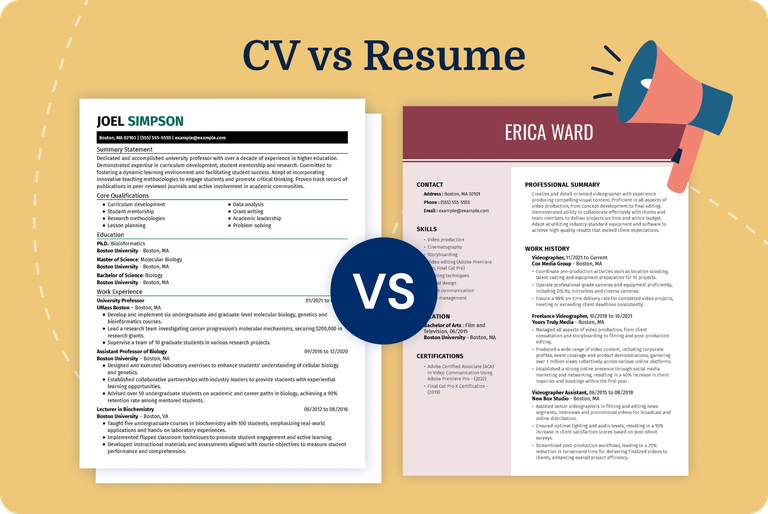Table of Contents
Get started with MyPerfectResume today!
- Build a resume on any device
- Pick an ATS-friendly template
- Tailor with AI copy suggestions
Why this resume works
- Quantifies accomplishments: By quantifying improvements like reducing reaction times by 20% and boosting assay throughput by 30%, the applicant showcases measurable value, as explained in resume accomplishments.
- Showcases career progression: The transition from technician to research scientist, and later team leader, reflects growing expertise and higher responsibilities over time in their biochemistry career.
- Highlights industry-specific skills: Industry-specific skills such as enzyme kinetics and molecular biology align perfectly with specialized roles, a fit often emphasized for healthcare fields at healthcare skills.
More Biochemist Resume Examples
Take a look at our biochemist resume examples to see the best ways to highlight your laboratory expertise, analytical skills, and research experience. These examples will guide you in creating a resume that stands out in the field.
Entry-Level Biochemist
Why this resume works
- Centers on academic background: The applicant’s academic background shines through a master’s thesis on enzyme kinetics and honors, establishing a solid foundation for early career achievements in biochemistry.
- Shows digital literacy: Automation skills boosting data accuracy by 25% highlight the applicant’s digital readiness, aligning with essential computer skills needed in modern labs.
- Effective use of keywords: Strategic inclusion of terms like ‘enzyme assays’ and ‘data analysis’ showcases the applicant’s understanding of keywords important for passing ATS filters.
Mid-Level Biochemist
Why this resume works
- Includes a mix of soft and hard skills: Combining technical skills with interpersonal skills, the applicant leads teams and publishes research, showcasing a versatile approach to complex biochemical projects.
- Demonstrates language abilities: Fluency in Spanish and intermediate French skill improve cross-cultural collaboration, facilitating effective communication in diverse scientific settings—highlighting language skills.
- Displays technical expertise: Specialized certifications in biochemistry and molecular biology show the applicant’s deep technical knowledge, essential for advancing lab efficiency and innovative biochemical research methodologies.
Experienced Biochemist
Why this resume works
- Showcases impressive accomplishments: By showcasing achievements like cutting process costs by 15% and securing substantial research funding, the applicant’s accomplishments reflect significant business impact and a senior-level performance.
- Lists relevant certifications: The inclusion of certifications from reputable organizations, such as the American Biochemical Society, in the resume highlights a commitment to expertise and continuous learning in the field certifications.
- Emphasizes leadership skills: Leading teams to reduce costs by 15% at BioInnovations Inc. speaks volumes about the applicant’s leadership skills and ability to drive impactful changes.
Biochemist Resume Template (Text Version)
Tao Kim
Tampa, FL 33605
(555)555-5555
Tao.Kim@example.com
Professional Summary
Experienced biochemist leading innovations in assay development and enzyme research. Proven track record in reducing lab processing times and increasing efficiency in biochemical analyses to support scientific advancements.
Work History
Biochemist
Biogen Solutions – Tampa, FL
June 2023 – June 2025
- Developed enzyme assays, increasing efficiency by 15%
- Led a team of 5 scientists to analyze bio-compounds
- Reduced reaction times by 20% through protocol optimization
Research Scientist
Molecular Dynamics Labs – Jacksonville, FL
June 2019 – May 2023
- Published 3 papers in peer-reviewed journals
- Enhanced protein purification processes by 10%
- Collaborated with 4 departments for project synergy
Biochemical Technician
Genomic Innovations Inc. – Tampa, FL
June 2017 – May 2019
- Assisted in developing synthetic DNA strands
- Maintained lab equipment, achieving 95% uptime
- Conducted chemical analyses with high accuracy
Skills
- Protein Analysis
- Enzyme Kinetics
- Molecular Biology
- Analytical Techniques
- Data Analysis
- Research Methodology
- Bioinformatics
- Laboratory Management
Certifications
- Certified Biochemist – American Chemical Society
- Clinical Research Certification – Society of Clinical Research Associates
Education
Master of Science Biochemistry
Stanford University Stanford, California
May 2017
Bachelor of Science Biochemistry and Cell Biology
University of California, San Diego San Diego, California
May 2015
Languages
- Spanish – Beginner (A1)
- French – Beginner (A1)
- Mandarin – Beginner (A1)
Related Resume Guides
Advice for Writing Your Biochemist Resume
Unlock the secrets to crafting a standout resume for your biochemist career with our tailored advice section. Dive into tips specifically designed to help you highlight your scientific skills, research experience, and passion for biochemistry. Ready to make your professional journey shine? Check out our guide on how to write a resume and start building a resume that truly represents your unique expertise in the world of science.
Highlight relevant technical skills
For a biochemist, technical skills are the backbone of their work. Highlighting these skills clearly on your resume is essential. You can create a “Technical Skills” section to list them in bullet points or mix them into job descriptions if they directly relate to your previous experience. This approach helps employers quickly understand what you can do and how you’ve applied those abilities in real-world scenarios.
Some common technical skills for a biochemist include lab techniques like chromatography, PCR (polymerase chain reaction), and spectrometry. Being able to use software for data analysis is also important, along with knowing safety protocols in the lab. These skills demonstrate that you can conduct experiments, interpret results, and maintain safe practices effectively.
Including these technical skills helps hiring managers quickly grasp your expertise. Whether you decide to feature them in a separate section or integrate them within descriptions of previous roles, make sure they’re easy to spot so they catch the attention of anyone reviewing your resume.
Example of a technical skills section
- Analytical techniques (HPLC, GC-MS, NMR)
- Enzyme assays & kinetics
- Protein purification & characterization
- Molecular biology methods (PCR, qPCR, cloning)
- Spectroscopy methods (UV-Vis, IR, fluorescence)
- Data analysis using R & Python
- Biochemical pathway modeling
- Cell culture techniques
- Bioinformatics tools (BLAST, Clustal Omega)
- Laboratory information management systems (LIMS)
Show how you work well with others by putting soft skills like teamwork, communication, and leadership on your resume.
Quantify your accomplishments
Quantifying accomplishments on a resume makes it stand out by showing exactly what you’ve achieved in previous roles. Instead of just listing what you did as a biochemist, like “conducted experiments,” using numbers can show your impact. For example, saying “developed a process that increased efficiency by 30%” or “reduced experiment costs by 15%” gives a clearer picture of your contributions. This way, hiring managers can quickly see how you made a difference.
In the work experience section, each entry should list your job title, employer name, location, and employment dates. But don’t stop there—turn duties into achievements with measurable results. Use action verbs like “led,” “improved,” or “optimized” to make your accomplishments pop. By including percentages or time savings, you’re giving concrete evidence of your skills and effectiveness. This approach helps transform a list of tasks into a compelling story about what you’ve done as a biochemist.
When hiring managers look at resumes, they’re searching for proof that an applicant can deliver results. Quantified accomplishments let them assess your impact fast. They help demonstrate not only what you did but also how well you did it. With these numbers and details, you’re more likely to catch their attention and show you’re ready for the next challenge.
5 biochemist work history bullet points
- Conducted enzyme assays to analyze metabolic pathways, increasing data accuracy by 40%.
- Developed and standardized new laboratory protocols, boosting experimental efficiency by 25%.
- Collaborated with cross-functional teams to identify biomarkers in disease research, contributing to a 15% increase in project funding.
- Authored peer-reviewed publications on protein interactions, improving department’s citation rate by 20%.
- Led the design of a high-throughput screening method for drug discovery, accelerating the process by 30%.
Need help with your resume? Browse our professional resume examples to find ideas and make yours stand out!
Write a powerful professional summary
A professional summary is a brief introduction at the top of your resume that grabs a hiring manager’s attention. When crafting your resume, you can choose between a summary or an objective. A strong professional summary highlights your skills and experiences right away, making it easier for employers to see what you bring to the table.
This section typically consists of 3-4 sentences that showcase your experience, key skills, and significant achievements. It’s best suited for experienced applicants who want to demonstrate their established career path and the value they offer. The purpose of this section is to highlight your professional identity and make a compelling case for why you’re a great fit for the biochemist role.
On the other hand, resume objectives are statements about your career goals. They are more suitable for entry-level candidates, those switching careers, or individuals with employment gaps. While a summary focuses on “what I’ve accomplished,” an objective speaks to “what I aim to contribute.”
Next, we’ll look at examples of both summaries and objectives tailored for different industries and levels of experience.
Biochemist resume summary examples
Entry-level
Recent biochemistry graduate with a Bachelor of Science from an accredited university, equipped with foundational knowledge in molecular biology and laboratory techniques. Experience in conducting research projects focused on enzyme kinetics and protein purification. Skilled in using chromatography and spectrometry tools, eager to contribute to innovative projects in pharmaceutical or academic settings.
Mid-career
Biochemist with over 5 years of experience in biochemical analysis and research within the biotechnology industry. Proven track record of managing laboratory operations, developing assays, and optimizing experimental protocols. Published author in peer-reviewed journals on topics such as metabolic pathways and gene expression regulation. Known for problem-solving abilities and collaboration skills in cross-functional teams.
Experienced
Senior biochemist specializing in drug discovery and development with 15+ years of experience leading research teams. Expertise in structural biology, bioinformatics, and high-throughput screening methods. Holder of multiple patents related to novel therapeutic compounds. Committed to driving innovation through strategic partnerships and mentoring emerging scientists to advance scientific objectives.
Biochemist resume objective examples
Recent graduate
Detail-oriented recent biochemistry graduate eager to contribute laboratory skills and knowledge of biochemical processes in an entry-level position. Aspires to assist in research projects and support advancements in pharmaceutical development through a commitment to rigorous scientific methods.
Career changer
Dedicated former healthcare worker transitioning into biochemistry, bringing strong analytical abilities and understanding of biological systems. Eager to apply interdisciplinary experience to support innovative research initiatives and contribute to discoveries in biochemical applications.
Specialized training
Emerging biochemist with specialized training in enzymology seeking a position within a dynamic research team. Passionate about applying technical skills and theoretical knowledge to further explore enzyme functions and mechanisms, contributing to the field’s understanding of metabolic pathways.
Pick a resume template that’s clean and straightforward. Stick to clear headings and readable fonts, steering clear of overly elaborate designs so managers can spot your skills fast.
Showcase your credentials
Listing credentials like certifications, licenses, and training is important for a biochemist because it shows your skills and knowledge. In technical fields like biochemistry, having the right credentials can help you stand out. Creating a special ‘Certifications’ section on your resume makes it easy for employers to see what you bring to the table. This section can go alongside your education details to give a full picture of your background.
- Certified Clinical Research Professional (CCRP)
- American Board of Clinical Chemistry (ABCC) Certification
- Certified Biotechnician Assistant Credentialing Exam (CBACE)
- Good Laboratory Practice (GLP) Certification
- Laboratory Safety Skill Certificate
Having these certifications can boost your chances of success as a biochemist by showing that you have the specialized knowledge needed for the job. They show that you are committed to keeping up with industry standards. Including them in your resume helps potential employers quickly see that you’re qualified.
Example of a certifications section
Certified Biochemist Specialist
Issued by: American Institute of Biochemistry
Issued 2022
Good Laboratory Practices (GLP) Certification
Issued by: World Health Organization (WHO)
Expires 2025
Biotechnology and Applied Biology Techniques Certification
Issued by: International Society for Biotechnology
Issued 2021
Molecular Diagnostics Certification
Issued by: National Association for Clinical Biochemistry (NACB)
Expires 2024
Hazard Analysis and Critical Control Points (HACCP) Certification
Issued by: Food and Agriculture Organization of the United Nations (FAO)
Issued 2023
Pick a resume template that’s clean and straightforward. Stick to clear headings and readable fonts, steering clear of overly elaborate designs so managers can spot your skills fast.
Salary Insights for Biochemists
Knowing salary data can help you make smart choices about your career path or moving to a new place. The U.S. Bureau of Labor Statistics has gathered this information, and you’ll find more details below.
Top 10 highest-paying states for biochemists
Biochemists earn varying salaries across the United States, with a national average of $99,529. The table below highlights the states where biochemists command the highest compensation.
Our salary information comes from the U.S. Bureau of Labor Statistics’ Occupational Employment and Wage Statistics survey. This official government data provides the most comprehensive and reliable salary information for writers across all 50 states and the District of Columbia. The figures presented here reflect the May 2025 dataset, which is the most recent available as of this publication.
| State | Average Salary |
|---|---|
| Florida | $146,110 |
| California | $130,030 |
| Wisconsin | $128,280 |
| Massachusetts | $123,450 |
| Tennessee | $116,020 |
| Pennsylvania | $114,280 |
| Virginia | $114,360 |
| Kentucky | $110,500 |
| Arkansas | $109,180 |
| New Jersey | $107,230 |
FAQ
Do I need to include a cover letter with my biochemist resume?
Yes, including a cover letter with your biochemist resume can significantly improve your application.
It provides an opportunity to express your enthusiasm for the specific research area or institution and highlight relevant skills and experiences that may not be fully detailed in your resume.
For instance, if the lab focuses on enzyme kinetics or pharmaceutical development, you can discuss any related projects or coursework that demonstrate your expertise in these areas.
You might also consider using a Cover Letter Generator to streamline the process and ensure your cover letter is polished and professional.
Additionally, reviewing cover letter examples tailored to scientific roles can offer valuable insights into effectively presenting your qualifications and passion for biochemistry.
How long should a biochemist’s resume be?
For a biochemist, a one-page resume is usually enough if you’re just starting out or have limited experience. Make sure to showcase your technical skills, lab expertise, and key research projects for quick impact.
If you’ve got a lot of experience, higher degrees, or numerous publications and presentations, then a two-page resume might be better. Just make sure each detail backs up your fit for the role by focusing on recent achievements.
Check out our guide on how long a resume should be for tailored examples and tips to refine yours at any career stage.
How do you write a biochemist resume with no experience?
If you’re crafting a biochemist resume with limited work experience, focus on education, skills, and projects or lab work that highlight your potential. For more guidance, check out this resume with no experience resource for entry-level resumes.
- Emphasize your education: Start with your degree in biochemistry or related field. Include the institution’s name, graduation date, and any honors or relevant coursework like molecular biology or organic chemistry.
- Highlight laboratory experience: If you’ve completed any lab courses or independent research projects during school, list them as experience. Be sure to include specific techniques you’ve mastered, such as chromatography or spectroscopy.
- Showcase relevant skills: Identify key skills from the job description and highlight those you possess. This might include data analysis, problem-solving abilities, familiarity with lab equipment, and skill in scientific software.
Additionally, consider including a section for internships or volunteer positions if they involved scientific research or laboratory work to further demonstrate your commitment and capability in the biochemistry field.
Rate this article
Biochemist
Share this page
Additional Resources

The Illusion of Wage Growth: Where Paychecks Stretch the Farthest
U.S. wages have climbed at one of the fastest rates in modern history. Between 2020 and 2024, the average American worker’s pay rose from about $64,000 to $75,600, an 18%

100+ Resume Objective Statement Examples & Best Practices
In just a sentence or two, a resume objective statement tells hiring managers the role or career path you’re aiming for and the unique skills and value you bring to

150+ Skills for a Resume: Examples for Any Job
Crafting a standout resume starts with highlighting the skills and qualifications that demonstrate your fit for the role. But in a crowded job market, knowing which abilities will actually catch

When to Use a Two Page Resume (With Examples & Formatting Tips)
If you’ve spent years building your skills, growing in your career, and racking up accomplishments, a one-page resume might not cut it. A two-page resume gives you space to present a

How to Make an ATS Friendly Resume (Templates & Guide)
In today’s fast-paced hiring climate, many employers use applicant tracking systems (ATS) to organize, store, and screen candidate information. Optimizing your resume for ATS is essential for ensuring your application passes

CV vs Resume: What’s The Difference?
Confused about the difference between a resume and a CV? You’re not alone! While both documents help you land a job, they vary in content, structure, and formatting. In this guide, we’ll
